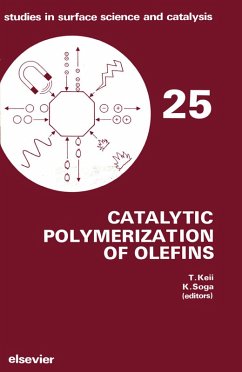This book covers the proceedings of a symposium which was attended by researchers from all over the world who reported on and discussed recent advances in the field of catalytic polymerization of olefins.
Over two decades have elapsed since the discovery of the Ziegler-Natta catalyst. Tremendous research effort has been aimed at improving this marvelous catalyst. In twenty-five years since the first publication, more than 15,000 papers and patents on the subject and on related subjects have appeared. This effort has yielded new generations of Ziegler-Natta catalysts with superior activity and stereospecificity. The complexities arising from the heterogeneity of the catalyst, however, have hindered understanding of the catalytic processes which take place on the catalyst surface. Nevertheless, many fundamental features of the catalyst system have now been clarified reasonably well. Recently a highly active homogeneous catalytic system has been developed, which is capable of catalyzing even isotactic polymerization of propene. There is no doubt that this finding will not only contribute to our understanding of the detailed mechanism of polymerization but also stimulate the development of various kinds of tailored polymers. Thus this subject will remain of paramount importance in the development of chemistry and polymer science for a long time to come.
Over two decades have elapsed since the discovery of the Ziegler-Natta catalyst. Tremendous research effort has been aimed at improving this marvelous catalyst. In twenty-five years since the first publication, more than 15,000 papers and patents on the subject and on related subjects have appeared. This effort has yielded new generations of Ziegler-Natta catalysts with superior activity and stereospecificity. The complexities arising from the heterogeneity of the catalyst, however, have hindered understanding of the catalytic processes which take place on the catalyst surface. Nevertheless, many fundamental features of the catalyst system have now been clarified reasonably well. Recently a highly active homogeneous catalytic system has been developed, which is capable of catalyzing even isotactic polymerization of propene. There is no doubt that this finding will not only contribute to our understanding of the detailed mechanism of polymerization but also stimulate the development of various kinds of tailored polymers. Thus this subject will remain of paramount importance in the development of chemistry and polymer science for a long time to come.
Dieser Download kann aus rechtlichen Gründen nur mit Rechnungsadresse in A, B, BG, CY, CZ, D, DK, EW, E, FIN, F, GR, HR, H, IRL, I, LT, L, LR, M, NL, PL, P, R, S, SLO, SK ausgeliefert werden.









